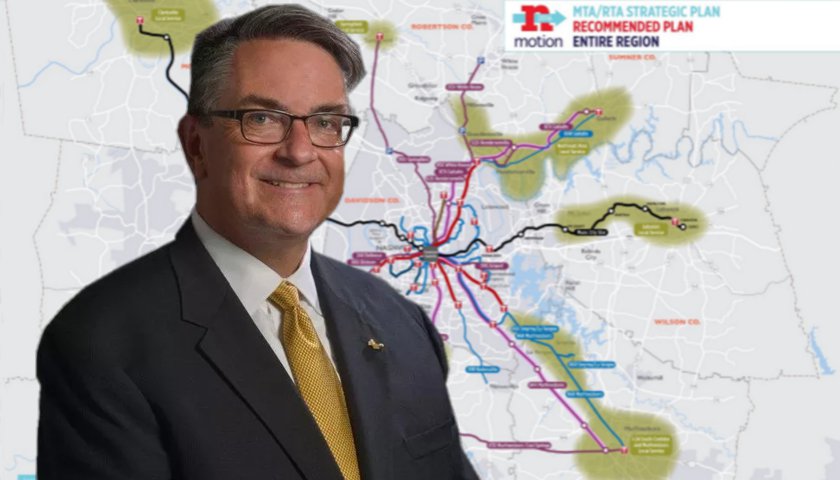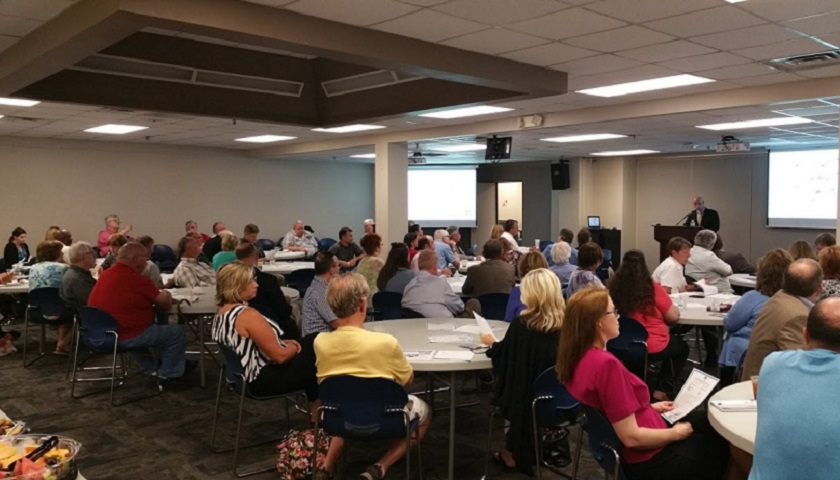GALLATIN, Tennessee — At an nMotion Plan Update for Sumner County meeting held July 27 at Volunteer State Community College, Regional Transit Authority (RTA) CEO Steve Bland said he “wouldn’t lie” that transit will not fix traffic problems, adding that “Denver still has traffic problems,” and, in fact, Atlanta and many other major cities with extensive transit systems are included on lists of cities with the worst traffic.
Bland’s admission confirms the work of Vanderbilt University Department of Economics Professor Malcolm Getz, who, representing his own views and not that of the university, states that evidence demonstrates that “better transit does not reduce congestion,” rather “the volume of vehicular trips expands to congest whatever space is available for traffic regardless of the level of transit service.”
Bland also said that “middle Tennessee’s system needs to be middle Tennessee’s system” and that there is no existing transit system doing it well enough for middle Tennessee to model after.
Following the Tennessee legislature’s approval of the IMPROVE Act, which included a provision called “local option transit surcharge,” nMotion Plan Update meetings have been held in other Nashville/Davidson surrounding counties, including Williamson and Wilson.
Steve Bland was named to the RTA Executive Staff as its CEO in July of 2014 with more than two decades of transit system experience including the cities of Pittsburgh, Pennsylvania; Albany, New York; Gloucester, Massachusetts; and York, Pennsylvania. Bland’s experience immediately prior to coming to Nashville was at Michael Baker International as program director of the Connecticut-based CTfastrak, a 9.5 mile bus rapid transit (BRT) system between the state capitol of Hartford and one of its western cities.
Since its first year of operation in 2015, CTfastrak had an expected annual operating cost of $10 million, but its actual operating cost has far exceeded that by 75 percent to $17.5 million a year, after initial construction costs of $570 million, $400 million of which was funded through federal grants.
Above and beyond his personal transit management experiences, Bland said he and others have traveled to observe transit systems in other states. In addition to people in those areas having very divergent opinions on their local transit systems, Bland said comments from his travel companions evaluating the systems for applicability to middle Tennessee are often, “that won’t work.”
Bland stated emphatically, “Not Atlanta,“ when asked whether the city could be used as a model for its transit system, and that the better systems are those that have matured to 30-plus years such as Denver, Seattle and Salt Lake City, adding that Charlotte “is on its way.”
Bland and Sumner County Executive Anthony Holt, who introduced Bland at the event, both made references to proper land use for housing at the right density for transit to work.








This whole thing is insane. Mass transit doe not even in the east coast cities with existing high population density. But they will spend our tax dollars endlessly in a failed effort to solve a problem with no solution.
I propose that the limitations imposed by standard highways moving typical vehicular traffic be permitted to control population growth.
A simple improvement would be to eliminate the existing HOV lanes that have proven elsewhere to cause a reduction in the total number passenger miles traveled as compared to having all lanes accessible to all commuters.
I’m a displaced New Yorker who moved here to the Nashville area 5 years ago. Love it here, except for the politicians who try to make decisions based only on their ideas and not logic, and not by referring to the experts or those who would be using their ideas. We had them in New York, too. The Long Island Expressway installed HOV lanes and the result was slower traffic since there is always a person in the HOV lane who goes below the speed limit making the lane useless to HOV users who just want to get to their destination. Bumper to bumper traffic on the three lanes on the right and an average of ten cars a minute on the HOV lane. DUMB!